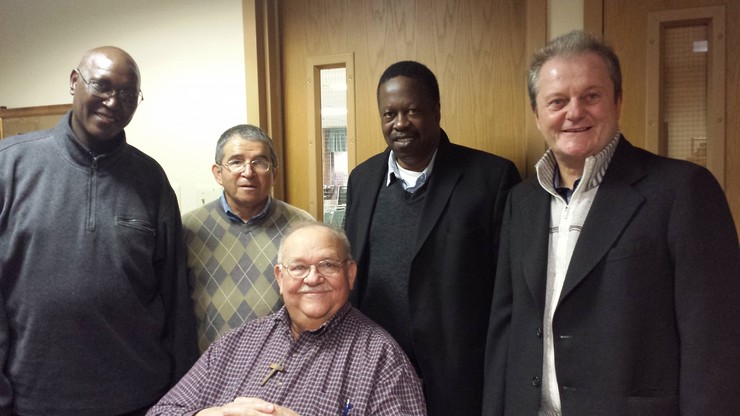Father Stefano Camerlengo, General Superior of the Consolata Missionaries, Father Dietrich Pendawazima, Vice General Superior, and Father Salvador Medina, General Councilor in charge of the Americas, paid a visit to us here in North America from October 17 to November 6, 2015.
Father Stefano, of Italian origin, first ministered in Congo as a Deacon, in the remote Diocese of Wamba, where then he was ordained a Priest in 1984. There he exercised his Priesthood for many years, learning both Swahili and Lingala. He was Superior in Kinshasa when the rebel Kabila overthrew Mobutu, and he witnessed many horrors in that quasi civil war. In the 2005 General Chapter, Father Stefano was elected Vice General Superior and in 2011 General Superior.
Father Dietrich has visited the US several times; the first, while preaching missionary appeals as a young priest. He studied theology in Colombia and then moved to Rome, where I met him, while he was attending the Gregorian University where he got a Degree in Social Sciences. He spent most of his missionary life in the formation of future missionaries, in Kenya and South Africa. In the 2011 Chapter he was elected Vice General Superior.
It is in Salvador de Bahia, Brazil, that Father Medina exercised his most challenging ministry as the Pastor of a parish in the slums of the town. When he was elected Councilor in charge of the Americas at the General Chapter of 2011, he was the Superior of the IMC Colombia province.
What was the reason for this visit? The Consolata Missionaries are trying to live in fraternity, and what better than such a visit to improve brotherly life, to share and pray together! It is also an opportunity to take stock of the situation and provide for the organization of the future of the Consolata Missionaries in North America. Since our arrival on this continent in 1947, there have been great changes: in the 1970s there were over 80 Consolata Missionaries in the US and Canada, but the number dwindled and got to around twenty this year; back then we worked in more or less twenty communities, now we are down to three in the US (Riverside, CA; Buffalo, NY and Somerset, NJ) and two in Canada (Montreal and Toronto). We are called to constantly reconsider what services we, as missionaries, should offer to the local Churches and people.
This was the heart of the two assemblies held: the first in Toronto, on October 19; and the second in Somerset, on November 4 and 5. In addition, the General Superior met individually with each missionary and took part, together with his Vice and his Councilor, in meetings with every local community.
What activity do we desire to exercise in this huge continent? Which houses should we keep? It is certain that we will continue our missionary awareness services in order to promote the mission in the North American Churches. Among these services, there are visits to parishes and groups to talk about the missions; our three magazines; our websites; as well as our fund-raising to sponsor projects throughout the world. But the question is still open: which are the projects that best promote the development and self-financing of our poor missions and of the young Churches? The Consolata Missionaries have always lent their cooperation to the pastoral activity of the Churches in favor of the immigrants; but now also here in North America, there are more and more people of other religions: how far can we engage in inter-religious dialogue that requires special preparation? The ministries to promote peace, justice and the integrity of creation are themselves part of our mission, but the activity in those fields is not easy either. Besides, how far should we go with the social networks that most people use and are constantly changing?
Moreover, what is the best way to organize the Consolata Missionaries here? Should we have only one Superior for our missionaries in Mexico, United States and Canada, where there are at least four cultures and three languages? Or is it better to have three small groups – one in Mexico, one in the United States and one in Canada – each with its Superior and its Council, given also that for our foreign colleagues it is increasingly difficult to obtain visas to regularly go from one country to another?
Father Stefano, Father Dietrich and Father Salvador have now returned to Rome where they held a meeting with the other two General Councilors. In these weeks, we hope the Holy Spirit will inspire them to give the best answers to all these issues. It is then up to us to carry them out. This will be our best way to be missionaries here in North America.
Fr. Paolo Fedrigoni, IMC, Somerset

